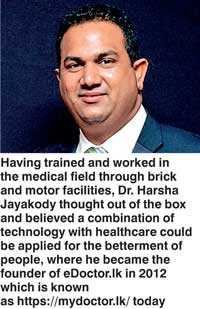Monday Feb 23, 2026
Monday Feb 23, 2026
Monday, 2 July 2018 00:00 - - {{hitsCtrl.values.hits}}
Imagine a time when healthcare services will be available anywhere and at any time. Imagine having access to a doctor from wherever you are, even if the doctor is nowhere near you. If this was possible, a diabetic child living in a village could receive medical advice from a Paediatric Endocrinologist living in a city; a senior citizen with a heart disease could be monitored daily at home and her drug dose can be adjusted by her general practitioner to reduce problems that cause unnecessary emergency visits; and a young man could get advice on his sexual problems without being embarrassed at a public health setting. How lovely it would be if medical advice could be available with ease, comfort, and speed!

The good news is that such medical advice is available, with telemedicine, which is the provision of distance clinical health services using electronic information and communication technologies, irrespective of the distance between patients and doctors. Especially in the western countries, telemedicine has been making progress in making medical advice easily available to people of all ages and situations. The technology keeps costs low, reduces waiting time for patients, and improves health outcomes.
The concept of modern medicine changes from treating diseases to treating individuals with the digital revolution. Technology must be harnessed in any attempt to treat a patient because modern day humans are intrinsically connected to technology. Most of their day is spent using some form of technology, and their activities are captured and monitored on the same technology. They monitor their activity, calories consumed and burnt, and health. This grants medical practitioners access to accurate, holistic data that can help in their diagnoses, thus helping to add healthy years to human life.
Adding the benefit that diagnosis and primary care can be done within the comfort of the home makes telemedicine a valuable option for any patient. The low costs and the easy access to technology make this a viable alternative to traditional health settings. Telemedicine is ideal for Sri Lanka because of the high ratio of patients to doctors that affect the patient’s ability to truly benefit from the expertise of the doctor. Additionally, the ease of access will reduce time and money spent.